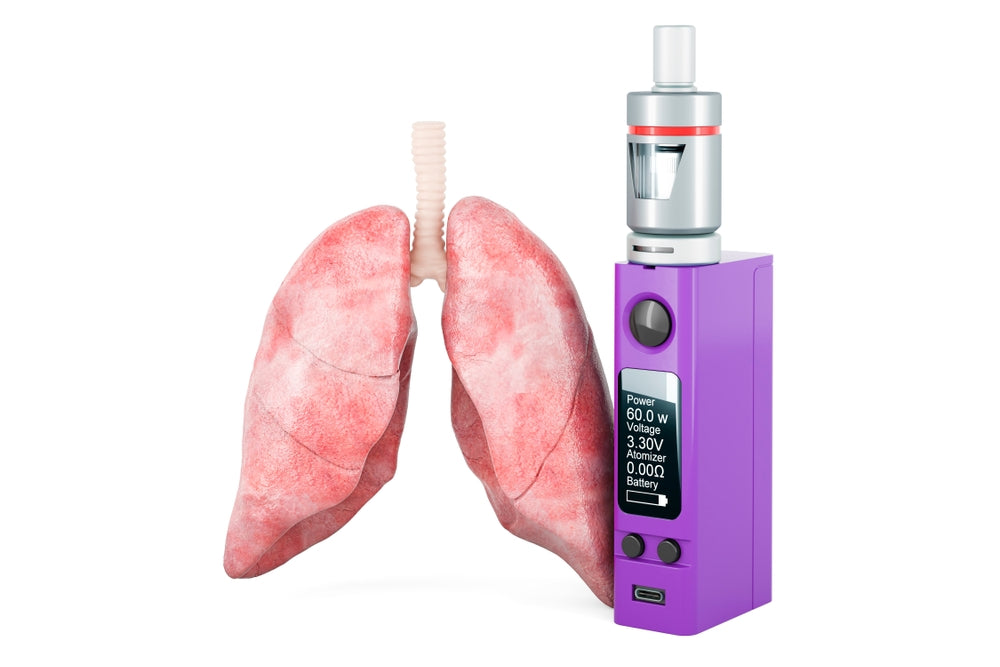Since vaping entered into the mainstream of society it has been dogged by questions of health and safety. The leading theory is that vaping poses less harm than cigarettes, as stated by Public Health England’s 2015 review which found vaping to be 95% less harmful vs tobacco cigarettes.
This landmark stat has been revisited each year since 2015, and is still held as true in the most comprehensive evidence reviews on vaping that we have available – most recently so in the 29th September 2022 report.
Despite this evidence, which has even prompted the UK government to launch vaping schemes to help people quit smoking using vaping devices. The reality is that we still know very little about the true long-term effects of vaping.
This is largely cited as being due to conflicting data, whereby most vapers used in trials are ex-smokers, which makes it difficult to distinguish whether or not a health issue observed during a trial has been caused by their previous smoking habits, or new vaping habits – this disparity has been highlighted again in the report we mention above, as well as many others.
Can Vaping Damage My Lungs?
The answer is we do not yet know. Evidence is mounting in favour of vaping being a tobacco harm reduction pathway, as it has been recognised by a number of UK authorities, including the NHS, as a powerful tool in a potential quitter’s arsenal. The reality remains however that inhaling anything other than air, is going to have a detrimental impact at some level.
Just as with air pollution in city centres and indeed cigarettes, vaping introduces chemicals to our lungs that would not normally be present. While the evidence may suggest this poses less risk than the many known carcinogens in cigarette smoke, this does not mean vaping should be considered totally safe, and is why those who have never smoked or vaped before are heartily discouraged from starting.
There have been many vaping related health outcries from popcorn lung to lung disease, however many of these have been proven to be heavily tied to unique contexts that in reality are not typical of mainstream vaping products. For example, many of the issues reported have been caused by people attempting to make their own e-liquids, or those which have been purchased from markets less regulated than the UK, such as the USA.
In the UK we must follow the TRPR (Tobacco and Related Products Regulation) which is our version of the EU-wide TPD (Tobacco Products Directive). This means many known damaging ingredients found commonly in flavourings are not allowed to be included, and any vape liquid registered for sale must be approved by the Medicines and Healthcare Products Regulatory Agency (MHRA).
While these processes do give greater assurance that vapers in the UK can have faith their products will not be harmful, as we have said – inhaling anything beyond air can have consequences we must be aware of.
While we do not yet understand how vaping truly effects the lungs, there have been suggestions that it can make it challenging to recover form infections as well as well as potentially worsening conditions in those already susceptible.

Can I recover From Lung Damage Caused by Vaping?
Without being able to properly say what damage vaping causes to your lungs long-term, this is difficult to answer accurately. There is also much conflicting evidence both professional and anecdotal that can be very polarised. This makes it hard for normal people to find the answers they seek.
Jatish Shah, Director of Shah Deaddiction & Rehabilitation Service Centre, stated that:
“Your lungs can definitely heal after quitting vaping. Of course, you have to give it time. As a general rule you will find that in 2 or 3 days your sense of smell and taste returns. In 5 to 7 days your bronchial tubes opening up and you will find it easier to breathe and, consequently, you will feel fresher. And from between 3 months and 9 months your lung capacity will increase by 10+%. Thereafter, there is nothing but benefits and benefits in terms of improving health.”
He caveats this statement by noting that more severe issues like Emphysema or Lung cancer can often be permanent, however there is still no comprehensive evidence to suggest vaping causes either of these issues, owing again to the conflicted smoker/vaper data we discussed earlier.
Stephen Broderick, a US John Hopkins Medical Lung Surgeon had this to say:
“In the last 24 to 36 months, I’ve seen an explosive uptick of patients who vape. With tobacco, we have six decades of rigorous studies to show which of the 7,000 chemicals inhaled during smoking impact the lungs. But with vaping, we simply don’t know the short- or long-term effects yet and which e-cigarette components are to blame.”
The issue again for vapers in the UK, is that Mr Broderick’s statement is not contextually relevant. The chemicals described as making vaping dangerous are Diacetyl, Formaldehyde, and Acrolein – all of which are banned from vape liquid in the UK.
Cancer research UK, who have access to data which is actually contextualised by our tighter safety regulations for UK vaping products has this to say about the impacts of vaping on your health:
“Lots of people want to know about the health effects of e-cigarettes. They’re still a relatively new product, so it’s too soon to know for sure. Many studies show that vaping is far less harmful than smoking. This is because e-cigarettes don’t contain cancer-causing tobacco, and most of the toxic chemicals found in cigarettes are not in e-cigarettes.
Some potentially harmful chemicals have been found in e-cigarettes. But levels are usually low and generally far lower than in tobacco cigarettes.
There is no good evidence that vaping causes cancer.
But e-cigarettes are not risk-free. They can cause side effects such as throat and mouth irritation, headache, cough and feeling sick. These side effects tend to reduce over time with continued use. We don’t know yet what effects they might have in the long term.
E-cigarettes should only be used to help you stop smoking, or to stop you going back to tobacco. Most e-cigarettes contain nicotine, which is addictive. If you have never smoked, you shouldn’t use e-cigarettes.”
Speak to Your GP
If you have been vaping and find you are suffering from any new issues such as coughing, wheezing or chest pain, then it is always best to go directly to your healthcare provider as they will always be best-placed to advise you about your health.
This same rule applies if you are a smoker wanting to quit and think vaping could help; if you have any concerns about health impacts, speak to your GP first. Equally, you can contact the NHS Stop Smoking Service for more information about how to build your quitting journey.



